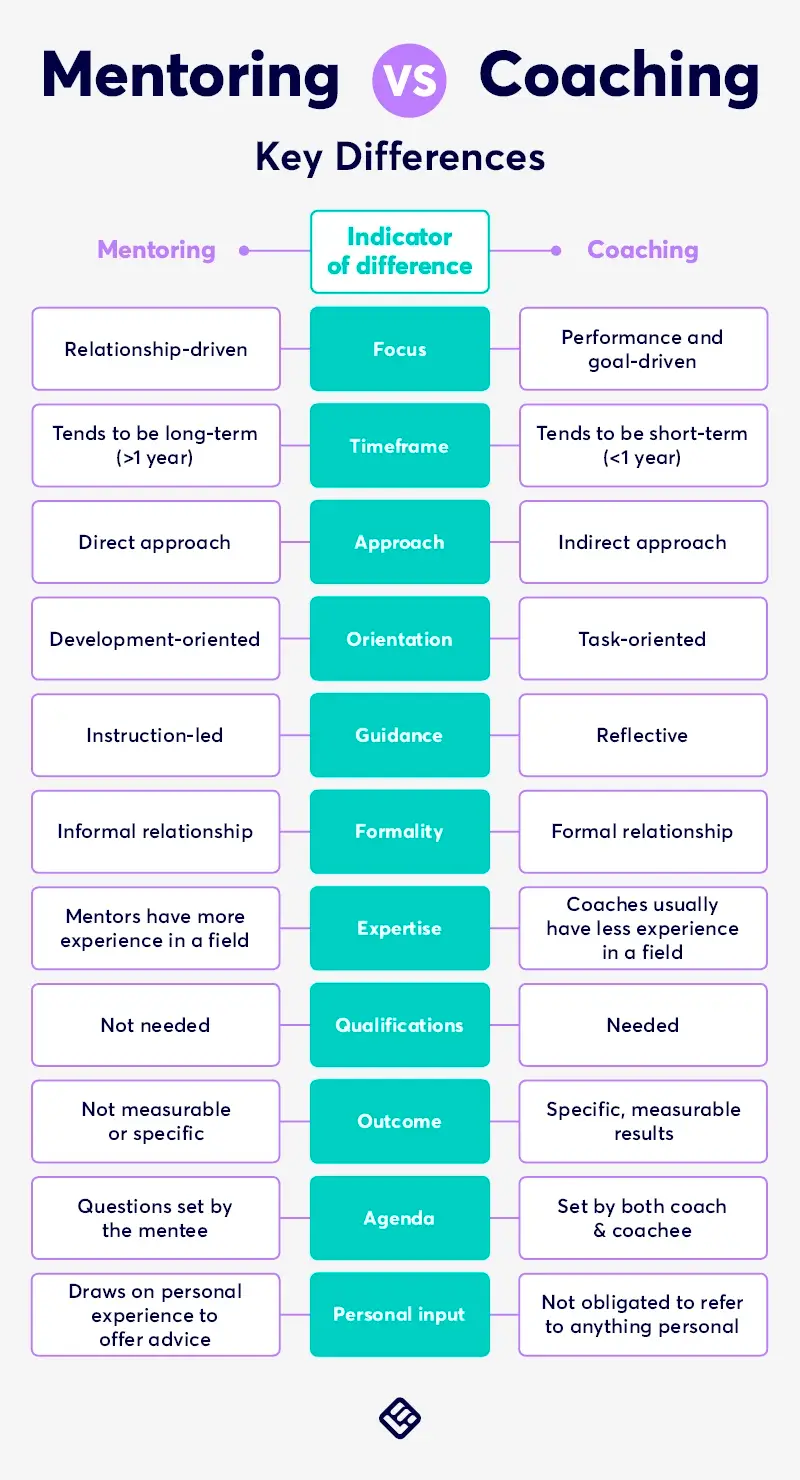Coaching vs Mentoring: Key Differences, Benefits, and How To Use Them

Table of Contents
💡 Did you know that 84 percent of Fortune 500 companies and 100 percent of Fortune 50 companies have mentoring programs?
💡 How about that coaching brought high ROI to 86 percent of companies, and 96 of those who had executive coaching said they would repeat the process?
Mentoring and coaching are two key development practices that have become quite popular, but how much do we really know about them? Lately, these two terms are used interchangeably, and while they serve similar concepts and ideas, they differ in their foundational goals and roles, primarily when used in business settings.
We decided to investigate these two practices further, as they are both very intriguing. This article aims to explain the differences between the two approaches, how to use them for your business, and what each offers to eliminate confusion.
We also discuss the impact of both mentoring and coaching on your business and offer some essential tips and suggestions on how to achieve growth and success.
Let’s dive in!
- 1What Is Mentoring?
- 2What Is Coaching?
- 3What Are The Key Differences Between Mentoring and Coaching?
- 4How Can Coaching And Mentoring Help Your Business?
- 5How Can You Use Both Mentoring & Coaching In Your Business To Achieve Success?
- 6What Are Some Tips For Getting Started With Mentoring Or Coaching?
According to Collins Dictionary, in business,
In this scope, mentoring refers to a senior or a more experienced person – a mentor who teaches a less experienced person on their job, helping them acquire more knowledge in a particular subject.
Mentors share their skills, knowledge, and experience to help individuals develop and grow. They act as the advisor, counselor, and guide to the junior member of a team and make sure to offer constant support, advice, and feedback to the trainee or mentee.
Borrowing Collins Dictionary definition again, this time about coaching,
The International Coaching Federation (ICF) describes coaching as a partnership. It offers a more extensive definition of coaching:
Depending on the context, the meaning behind coaching changes, but it is often used to describe the process where a coach guides individuals towards improving in specific personal development or professional development areas, e.g., productivity or overall performance.
A coach offers guidance to individuals by helping them achieve their goals and reach their full potential. To do this, the coach gives the power over to the coachee, allowing them to come up with their own conclusions using active listening, questioning, and challenging their perspectives.
Mentoring and coaching are professional development tools with many similarities and core values.
Both approaches cover the following:
However, if you look closely, it becomes easy to spot some essential differences, which leads to the conclusion that mentoring and coaching are, in fact, two very different concepts.
💁 Whereas mentoring is more about sharing experience and knowledge with someone, coaching is more about helping them unlock their potential.
These are the key characteristics of mentoring:
These are the key characteristics of coaching:
Following is a table that illustrates the major differences between coaching and mentoring:

So, at this point, you might ask, which one is right for your business? Well, it depends. And do you really have to choose one over the other? Let’s see!
Mentoring is an excellent option to help your employees with their long-term development. But, if you want to help them achieve specific goals, coaching might be a better fit.
Remember that your decision does not need to be restrictive when contemplating coaching vs. mentoring. For example, using both approaches as part of an employee training program can help bring greater rewards to your business.
So we have already explained what coaching and mentoring do. Let’s see now how these two practical approaches can help your business. What are their benefits for business owners?
Here’s what we have discovered about coaching and mentoring from our extensive research:
1. Help employees develop new skills
Whether it is learning how to manage time more effectively, developing their selling skills, fine-tuning existing interpersonal skills, or building on knowledge in their current role, it is much easier to do so with mentoring or coaching.
2. Allow employees to overcome challenges
We all face hardships in business, and coaching can help to overcome them. Is this figuring out how to deal with a demanding customer? What about finding new ways to market your products or services? A coach or mentor can help you find the necessary solutions and answers.
3. Improve employee engagement and retention
For a business, it is vital to keep employees motivated and engaged in their work at all times. While employee turnover can be detrimental to a business, employee retention promotes the health of any business, creating a productive workplace that builds better business-to-customer relationships.
4. Can be easily integrated into any business structure
Regardless of how your business works, it is really easy to start from scratch and develop a dedicated coaching and mentoring plan for your staff. Both can be integrated into your L&D programs and contribute to the broader growth plan of your organization.
5. Boost confidence, productivity, and employee morale
Coaching and mentoring can help employees develop self-confidence, increase their productivity, and build up their motivation. Having a clear personal or professional goal in place as part of a larger development plan is an essential fuel to anyone’s career trajectory.
6. Offer an objective perspective
Any business leader or employee may be too involved with their daily tasks and often miss the bigger picture. However, a good coach or mentor can spot weaknesses by providing an objective perspective on your business and introducing new action plans; an invaluable skill for making strategic decisions!
7. Enable organizations to achieve their business objectives
Using a mentor’s experience and a coach’s knowledge, you can identify the steps you need to reach your goals as an organization. This way, you get to lead your business effectively, knowing that you also give your employees the chance to advance as individuals and grow with you along the way.
8. Build on accountability and speed up learning
It is easy to get sidetracked when you are running your own business, or you are busy completing daily work duties. Having an expert in your corner can help you and your team stay focused and motivated, even when things get tough. A mentor or coach will help employees stay on track by holding them accountable and providing regular check-ins.
9. Improve individual performance
It becomes easier to identify goals and learning needs and therefore create immediate access to learning resources. The steps that foster growth and personal development are already there. Through the right training plan and a coach or mentor, you can help your people walk their own path to success and improved performance.
10. Foster change and strategic planning
Use both approaches to resolve issues and bring a new direction in management through succession planning. Doing so should create a roadmap that encourages innovation and helps to identify critical positions in your organization. This way, you take advantage of current business strategies that align with industry trends, enabling you to stay relevant in the market.
Mentoring and coaching can be used in different ways in your business. You can consult with your HR team and decide to use mentoring to help your most junior-level employees develop key competencies and knowledge.
You can also use coaching to support your senior-level staff in the process of discovering their full potential and advancing their career.
Another excellent idea is to use mentoring and coaching to create a culture of learning and development in your business.
Both development practices can help your business grow while investing in your people:
With a mentoring program in place, you can respond to specific needs that are personalized to each individual. For example, you get to choose to invest in leadership development and allow your business leaders to explore new ways of managing a team. Alternatively, you can help your employees gain specialized knowledge in roles that require advanced technical expertise.
Likewise, with a proper coaching program and a business coach, you can provide your employees with all the career development tools and training resources they need to bring their best selves forward. It’s a win-win situation!
To build such programs effectively, you will need to use a powerful learning management system – LMS like LearnWorlds, that allows you to onboard your team and regularly feed them with relevant training content. With the right LMS, any mentor or coach – whether they are hired externally or working internally for your business, can do wonders.
An LMS can help your coach or mentor stay in touch with your employees – or even your customers – every step of the way, schedule live sessions, share eLearning material easily, and have all necessary resources in one place.
No matter how you plan to use mentoring and coaching in your business, remember that these two approaches are different, so to bring the best results, they should be used accordingly. The secret to success at this point is identifying the best way to incorporate both to help your employees and other stakeholders achieve their goals.
If you struggle to decide which way to go, try asking yourself these questions:
Once you choose your business objectives, it will become easier to build the mentoring or coaching program that suits your needs best.
Regardless of your decision, it is important to keep an open mind as you move forward.
With a mentoring and coaching program in place, you can never go wrong regardless of your short- or long-term business goals. A genuine interest in your employees’ development always translates to greater engagement, increased morale, and improved retention rates.
So, if you want to take your business to the next level, providing effective mentoring and coaching your employees is the answer. Both practices can help your team develop new skills, overcome challenges, stay dedicated to their tasks, go the extra mile, and explore more personal and professional growth opportunities.
Are you ready to make this happen? Find an effective coach or mentor today and start investing in your employees and your business’s hidden potential.
Further reading you might find interesting:
Kyriaki is a Content Creator for the LearnWorlds team writing about marketing and e-learning, helping course creators on their journey to create, market, and sell their online courses. Equipped with a degree in Career Guidance, she has a strong background in education management and career success. In her free time, she gets crafty and musical.


